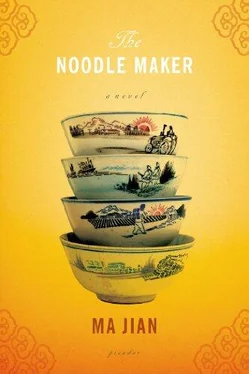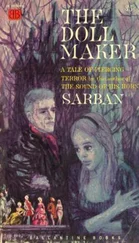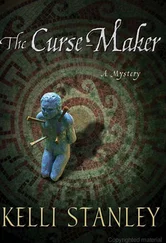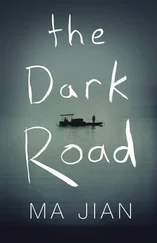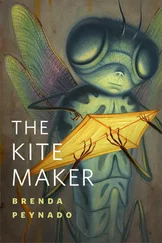‘My very own place in history!’ the writer exclaims to his friend. ‘Just one short novel, and I can enter The Great Dictionary of Chinese Writers.’
The donor nods his head. ‘You will become immortal.’
‘I must find a living Lei Feng, but I can’t think of anyone suitable.’ The writer remembers taking out his diary on his first day in the re-education camp, and writing on the front page: ‘Just like Lei Feng, I will be a screw that never rusts. Wherever the Party chooses to place me, I will shine.’ He remembers learning how Lei Feng wore the same pair of socks for five years, darning them again and again, preferring to give his money away to the poor rather than buy himself a new pair. The writer racks his brain, trying to think of someone he knows who shows the same selfless, heroic qualities, but all that comes to mind are the characters of his unwritten novel: a young entrepreneur who runs a private crematorium; an illegal migrant who writes letters for the illiterate; a father who spends his life trying to get rid of his retarded daughter …
These are people he knows, has read about or sees every day on the streets. They are the people he understands, the people he’d write about, if he had the courage. Their lives are as miserable and constricted as his own. But he is fully aware that if he wrote about these sad and feeble characters, his leaders would consider him unfit for the post of professional writer. He would lose his state salary, his apartment, his membership of the Writers’ Association, and any chance of being included in the literary encyclopaedias.
The chunks of goose meat are enjoying a gentle massage by their stomachs’ digestive juices. The friends seem more at ease now.
‘The eggs are ready,’ the blood donor says. ‘You will enter The Great Dictionary . You’re a writer, the conscience of our generation. But look at me! I’ve saved hundreds of lives by giving blood, but what have I got to show for it? I could die tomorrow and no one would know. Unless you decide to write about me, of course.’
‘Your profession is despicable. It’s degenerate. It proves that human nature is essentially evil.’
‘Roast goose doesn’t grow on trees, you know.’ The blood donor points to the pieces of spat-out bone stuck to the manuscript paper. ‘If it weren’t for me, the national blood banks would be empty. I’ve bled myself dry for this country.’
‘They still haven’t put any ginger in their fish-head soup,’ the writer grumbles.
‘If it weren’t for me, this country would be finished!’
‘Foreigners give blood for free,’ the writer retorts. ‘You’re a fraud, a fake philanthropist.’
‘I’m more real than you are,’ the blood donor snaps, touching a nerve. Over the years, he has slowly learned to speak the writer’s language, and knows where to insert his knife.
‘The king is in trouble now!’ the writer chuckles to himself, leaning back in his chair. ‘The sailors are clambering to shore …’
‘The factory leaders depend on us to fulfil their blood donation quotas. If their own employees gave blood, they’d have to fork out thousands of yuan a year on sick pay and convalescent breaks. We only take cash, and we’ve never asked for a convalescent break. Many factories have been granted the status of “advanced enterprises” because of the blood we’ve given on their behalf. Well, I’m an “advanced blood donor”, a selfless Lei Feng devoted to the cause of the people. You say foreigners give blood for free. Well, if the government could be bothered to give me a proper job, I would give blood for free too.’
The writer’s jaw drops. ‘You — a living Lei Feng! All right then, I’ll write about you. The blood-donating saviour of the people. The new Lei Feng. But the trouble is — you make money out of it …’
‘So what?’ the blood donor says, unwilling to let slip this chance to achieve fame. ‘I’m more Lei Feng than Lei Feng! If you write about me, you won’t have to bother to “Go Down among the Masses” or to “Learn about Life through Personal Experience”. I gave blood twice in one day to help out a man who had been ordered to give blood by the Party. Not even Lei Feng would have done that. And as for all the other good deeds I’ve done in my past, well you know about them already.’ He snatches the bottle of medicinal wine from the centre of the table, pours out a few drops for the writer, and empties the rest into his own glass. Then he gets up from the table and goes to fetch a box of matches. ‘You always promised you would write about me,’ he says, lighting a cigarette. ‘I would have given up this job ages ago otherwise.’
‘Do you know anything about the brain?’ the writer asks blankly. ‘My thoughts seem to arrive in unconnected paragraphs. They never connect. They set up home in my mind and pour their hearts out. They couldn’t care less about me, but I depend on them for my livelihood. You, though, have always been rooted to the real world, and over the years, you’ve influenced me and brought me down to earth. Who knows? Tomorrow I might just start giving blood myself. But I …’ The writer takes a drag from his cigarette, and glances at the blood donor sitting opposite him. ‘ … I’ve influenced you too. You’ve taken every word of criticism I’ve used against you in the past, and now you’re using them against me. Maybe you’re the one who’s going to end up in the history books. You and your lot.’
‘I don’t eat much these days,’ the blood donor says. ‘It takes me twice as long to climb the stairs now. My movements are clumsy.’
‘You’re in better shape than I am. In the re-education camp, you were the pasty one. Always playing sick, lying in bed while the rest of us were out working.’ A sour tone has crept into the writer’s voice, as it always does when the first bottle of wine is finished. My mind is filled with stories, he thinks to himself. But I have no idea how to piece them together. I need to be with people. I need to go out and speak to people before I can reach any deeper understanding.
‘You swallow jugfuls of water before giving blood,’ the writer adds, after a long pause. ‘You could harm someone that way.’
‘I’ve only done that once. What others get up to is their own business. Most of the recruits tie metal rods to their legs these days.’
‘You’ve never really grown up.’
The blood donor stares at the writer’s face, trying to assess the seriousness of the remark. But the writer’s eyes are hidden behind his glasses, and there is no emotion in his voice.
‘You are utterly self-centred,’ the writer continues. ‘You never pay attention to the world around you.’ Reaching for a second bottle of wine, he thinks to himself: As far as he and I are concerned, Lei Feng is a dead man, like any other. Everyone is equal in death. What’s the difference between General Cao Cao, Marshal Liu Bei, and Comrade Lei Feng? They’re just a bunch of dead men, that’s all …
The blood donor looks at the writer’s mouth, then at his ears. He knows that it’s his mouth that draws him to this room. In the re-education camp, he and the other urban youths would sit around the writer and stare at his mouth, waiting to hear what would come out of it.
‘Could you ever be entirely selfless and devote yourself to the people?’ the writer asks with a sneer. His question seems to be directed at both himself and the blood donor.
‘I refuse to be anyone’s slave. The constitution states that all men are equal, so why should I put myself down and sacrifice myself to others?’ The blood donor has dropped his obsequious tone. He has clearly given up trying to persuade his friend to write about him.
The writer remains silent. He knows that his life is almost entirely devoted to the Party. But he has no idea who the Party is. He knows that the Party was around before he was born, and has controlled him his entire life. Every part of him belongs to the Party. The Party told him to write novels. It could tell him to die too if it wanted — he’d have no choice in the matter. Vlazerim exchanges his blood for food, he exchanges his mind instead. He remembers how the blood donor looked as he gobbled the roast goose: his entire body consumed in the act of eating, his mind focused on the need to eat, the need to survive. When he bit into the chunk of goose breast, a blob of grease dripped down his shirt and fell onto the table.
Читать дальше
